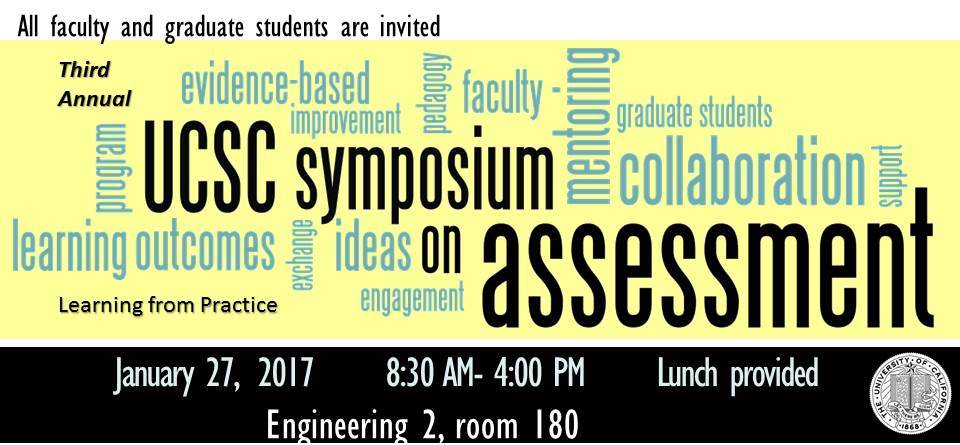2017 Symposium on Assessment of Learning

2017 Symposium on Assessment: Practices and Strategies
The third annual Symposium on Assessment of Learning was held on January 27, 2017. This event featured presentations and discussions by faculty, librarians, assessment specialists, and graduate students from UC Santa Cruz and six other campuses.
8:45 Coffee
9:00 Welcome and Opening Remarks
Herbie Lee, Interim Campus Provost/Executive Vice Chancellor, UC Santa Cruz
9:10 Session 1. Undergraduate Education
Presentations focus on how faculty have approached assessment — including posing research questions, designing studies, and drawing conclusions — as well as how they have engaged their colleagues in the various stages of assessment.
-
Committee-based Approach to Outcomes Assessment, Noriko Aso, History Department, UC Santa Cruz
-
-
-
10:30 Coffee Break
10:45 Session 2. Undergraduate Education (continued)
Presentations focus on assessment of Critical Thinking Skills, Writing, and Information Literacy Skills in Writing courses and Senior Seminars. Assessment tools, teaching strategies, and ways to collaborate with university librarians will be discussed.
-
Teaching and Assessing Analytic Thinking and Writing Skills in the Technology and Information Management Major, Subhas Desa and Paul Vroomen, Technology Management Department, UC Santa Cruz
-
Contextualizing Criteria to Measure and Improve Students’ Critical Thinking Skills in the Art Major, Enrique Martinez Leal, Art Department, UC Santa Cruz
-
-
12:00-1:00 Lunch Break
1:00 Session 3. Graduate Education
Presentations focus on developing methods for assessing graduate learning outcomes and on the role of assessment in addressing critical issues in graduate education.
-
-
-
2:30 Closing Remarks
Questions
For questions or more information, please contact: Dr. Anna Sher (asher@ucsc.edu; (831) 459-4302)
Materials from previous symposia
The first and second UCSC Symposium on Assessment events were held in October 2014 and November 2015. These symposia featured presentations and round-table discussions by UC Santa Cruz and UC Merced faculty, graduate students, and assessment staff. Over 60 participants at each event shared their experiences and ideas.
-
The 2015 Symposium topics included assessing student learning, evidence-based improvement, and mentoring graduate students in pedagogy and assessment.
-
The 2014 Symposium topics included establishing a collaborative process of Program Learning Outcome assessment, mentoring graduate students in assessment, approaching assessment as pedagogy, and presenting assessment skills on the job market and in tenure and merit review.

